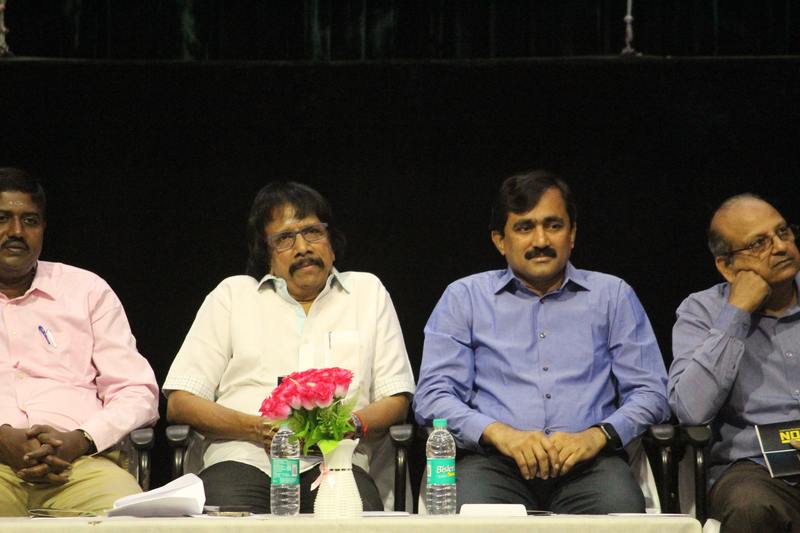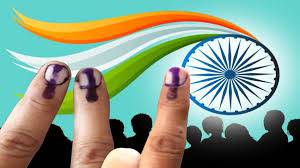Mr. Ponraj, who was the scientific advisor to Dr. APJ Abdul Kalam, was present in college during the inauguration of Vision '18, the symsposium of department of ECE. Here is an exceprt from an interview with him:
Q) Your work in the field of science is incredible. As a school or college student, did you imagine you would reach such great heights?
When I was in 10th standard, I saw a news article on the launch of the SLV-3 rocket - that day, I made up my mind that I wanted to be a scientist. I started studying and empowered myself with all the knowledge I would need to be a scientist. I did a BSc in Mathematics and then went ahead to do an MSc in Computer Science. Following that, I worked as a Junior Scientist at the Indian Institute of Science, Bangalore and then as a Junior Information Scientist at the Madurai Kamaraj University. I then became a “Scientist C” at the aeronautical development agency where Dr.Kalam was the director. That's when my dream came true. It’s all about how you dream; if you dream first, and then work towards achieving that dream – you will certainly be successful. Dr.Kalam was my role model and I had the chance to meet him and travel with him for 20 years. I was his last PhD student.
Q) Many people would have had dreams similar to yours, what do you think you did differently to achieve those dreams?
I come from a very small village and have always wanted to contribute to the society’s welfare. I did not know English during my undergraduate studies. When I was doing my MSc, on the first day, the Vice Chancellor of the institution gave a 20 minute address in English. I did not understand a single word and felt very ashamed, and it was then that I made up my mind to learn English. I used to read The Hindu till 3 am, write and practice sentences, find meanings of new words and make attempts to use those words while speaking to my friends the following day , which mostly resulted in them making fun of me, but I was undeterred. I kept trying until I succeeded and today, I have co-authored a book with Dr.Kalam titled ‘A Manifesto for Change’ and have written more than 2000 English speeches for Dr.Kalam. Life is a quest for knowledge - if you have the determination to achieve and conquer, it is more than enough for you to succeed in life.
Q) Please share with us some of your most memorable experiences with Dr.Kalam.
In a Republic Day address, Dr.Kalam officially announced the release of the 'Energy Independence Vision 2030'. It was a time when our country was talking about 'Energy Security', but Dr.Kalam released a vision for 'Energy Independence' i.e. not depending on any foreign countries for energy. Dr.Kalam had also made me in-charge of a project to install a 5 Megawatt solar power plant at the Rashtrapati Bhavan. There were a lot of hurdles in the completion of the project and at one point I gave up and went to Dr.Kalam and said “Sir, you are pressurising me, but I am not getting the required support from other officials for the completion of this project”. The first thing he did was get me a tender coconut and then he said “whenever you want to move a file, send an e-mail; if you feel you need to send an email, send a fax instead; when you feel you need to send a fax, make a call; and where you need to make a call, go and meet personally. Then, your work will be easy! Personal communication is very important. Regardless of the efficiency of the system, personal rapport is most effective.”

Q) Research is very vital to every country. How is the research domain in India?
There are two types of research: incremental research and innovative research. Incremental research is doing research on already existing theories, whereas innovative research is to find solutions to problems in the nation. Currently, we are giving more importance to incremental research than innovative research and we wait for solutions to existing problems to come from outside the country. Rather, we must solve our problems ourselves. Many research ideas develop in educational institutions, and further materialize only through industry-academia collaboration, along with government policies. In the book 'Manifesto for Change’ , Dr.Kalam proposed an idea to catalyse the need for research in India - we must start a new lab for research and identify the best minds from all over the country, educate them in the world's best institutions; the only criteria is that they need to create patents in various sectors. After creating patents, we must retain them in India for 6 years. This will surely create a pool of brilliant minds and a storm of ideas for research. One who intends to do research must focus on existing problems and challenges and see what innovative solutions can be brought, only then will the research sector of a country develop.
Q) Most students dream of working in MNCs outside the country rather than in public sector companies. What is your view on this issue?
This trend among students is due to the dearth of opportunities available in our country lately. Companies from outside view countries like India as regions suitable for low cost outsourcing and hence are ready to employ individuals, and the students grab the offers thrown at them. India should encourage industrial development. 25 sectors have been identified in the 'Make in India' program. If investments are made in each of these sectors, regardless of the field of study, one will get employment opportunities in abundance and the idea of leaving the country and seeking jobs will reduce. Now, there is a gap between those with the knowledge and job opportunities to put that knowledge to use, and this gap must be bridged.
Q) What is your advice to the youth of India?
The current generation has a lot of distractions. If you have a goal, a vision, then no diversion should deter your focus. I am not saying that you shouldn't enjoy, watch movies or socialize etc., but you should not let all these things enslave you. There is good as well as evil around us, we must understand everything but not succumb to the evil. Only when you overcome the evil forces can you get the spirit to achieve, i.e. unless you win over failures your success won't be
long lasting.
The Guindy Times thanks Mr.Ponraj for his time.





